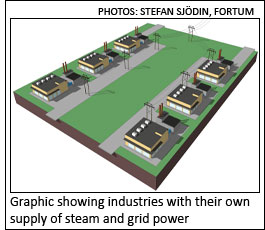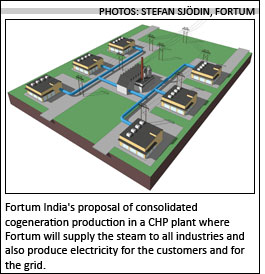 — Matti Kaarnakari,
Managing Director, Fortum India
— Matti Kaarnakari,
Managing Director, Fortum India
Headquartered in Finland, Fortum’s activities cover generation, distribution and sale of electricity and heat, as well as O&M of power plants. In September this year, Fortum opened its India office to explore investment opportunities in the field of combined heat and power (CHP) solutions to industrial clusters.
Matti Kaarnakari, in an exclusive interaction, tells us more about the strategic fit between Fortum’s core competence and India’s growing need for clean and sustainable energy. An interview by
Venugopal Pillai.
To start with, please tell us on
what key energy-related
services would Fortum be providing
to India in the initial phase.
In our view, there are many positive
things that we could bring to
the table in establishing ourselves
in India.
Firstly, there is the matter of efficiency
and reliability. By establishing
a CHP plant within an
industrial cluster, we can offer
very high efficiency and security
of both power and steam supply,
which differs from the currently
used utility service model.
The sustainability of our solutions
is an important differentiating
factor as better usage of primary
fuel energy and also our fuel
strategy maximising use of nonfossil
fuels will reduce emissions
and environmental impact.
We have an excellent track
record of project execution and
completing CHP projects in time
and cost, and with high quality.
During the life time of a plant, we
can secure high efficiency
through using our advanced tools
for process operation and maintenance.
Can you tell us more on the
investment of €200 million
that Fortum proposes to make in
the industrial CHP segment in
India?
We are currently assessing investment
opportunities in industrial
CHP. Initially we could be thinking
of possibly 2-3 CHP plants. If
we take an average size and cost
of a possible plant, roughly, that
could mean total investment of up
to €200-250 million. However, it
must be noted that any potential
investment will be separately
decided on and it must meet our
targets and be financially attractive
to us.
There is no earmarked investment
money for India and we only
move ahead if and when we find
opportunities good enough.
 India represents a strong
case of strong energy
demand coupled with "environmental
responsibility". How do
you therefore assess the country
as a market for clean and sustainable
energy sources?
India represents a strong
case of strong energy
demand coupled with "environmental
responsibility". How do
you therefore assess the country
as a market for clean and sustainable
energy sources?
In Fortum, we are currently doing
business development work
regarding our possible future role
in PV solar production. As we are
now based in India and as India is
very fast developing in this space
having extremely good conditions
for direct solar energy-even in a
global comparison. We are also
interested to understand what role
solar energy in India could play
for our company in the future.
In Fortum, we believe that the
energy system must be developed
into a more efficient and more
environmentally sustainable one
in the long term. We call that a
journey towards a Solar Economy.
This means that we strive for a
future where we see an overall
efficiency in production and in the
use of fuels. We also strive towards
utilising the sun as the primary
source of energy production, both
directly through solar energy but
also indirectly through for example
hydropower, wave power etc.
Even if CHP is essentially thermal
capacity, we see that it is a
crucial part for us on that journeyin
the transition phase from current,
mostly low efficient and high
emitting, conventional capacity to
high efficiency with low emissions-
both because of the greatly
increased efficiency independent
of what fuels we use but also due
to the extensive experience we
have in Fortum as the globally
fourth largest company in heat
business, not only in combined
heat and power production in
general, but also in the use of biofuels
or waste as fuels.
Even whilst admitting that
India is indeed a big energy deficient
market, setting up energy
infrastructure has not exactly
been easy. What are the key challenges
that Fortum is anticipating?
We recognise the current issues,
e.g. around access to fuel, particularly
coal and the need of policy
measures required to be implemented.
However, we believe that
the market and policies will
evolve to allow meeting the huge
need for new production capacity
which is required to meet India's
GDP growth aspirations.
We understand that Fortum
would provide industrial
CHP solutions using local agrobased
fuel. Can you describe the
business model in some more
detail?
Fortum has long experience on
fuel flexibility. We design our system
configuration in a manner
that allows for multiple types of
fuel being used.
In addition to upfront design of
the system for multi-fuel usage,
we always carefully scrutinise
opportunities to use available
local resources such as waste fuels
and various types of biomass. In
India this could mean for example
coconut shell, cashew shell, rice
husk, bagasse etc. CHP is much
more energy efficient than conventional
thermal production. In
CHP we can make use of up to 90
per cent of the energy content of
the fuel whereas in conventional,
e.g. coal-based production we
reach typically well below 40 per
cent efficiency in primary fuel use.
Despite being an agrarian
economy, India so far has not
been able to gainfully use its
agro-waste through biomass
plants due to high cost of generation.
What is your view?
Elsewhere, we have developed
good experience in fuel procurement,
and we hope to be able to
bring this competence to India
also. When we are more developed
in our potential investment
plans, we will also hopefully have
a better view on using biomasses
as fuel in India. Everywhere, the
critical issue is to manage the biomass
collection and logistics.
 We understand hydropower
accounts for a big proportion
of Fortum's global business. Do
you have plans of tapping this
source in India, perhaps in the
next phase of your Indian story?
We understand hydropower
accounts for a big proportion
of Fortum's global business. Do
you have plans of tapping this
source in India, perhaps in the
next phase of your Indian story?Initially, we are looking at potential
opportunities to invest in CHP
production for industrial clusters
and also assessing potential
opportunities in solar PV.
Tell us about Fortum's presence
in other emerging
Asian economies, mainly China.
Currently, our primary focus in
Asia is on India.
As a foreign investor in
India, what key policies (or
policy changes) do you think
would expedite FDI inflows in
the power sector, and accelerate
project implementation?
Any investment in power generation
means that we will invest in
assets which are expected to operate
for several decades. That is
why in India as in any energy market,
for an investor, it is very
important to have transparency of
the policy measures and also in
the longer term, the measures
should be consistently implemented.
Now that Fortum's engagement
with India has begun,
what key milestones would you
like to cross in the next, say, five seven
years?
To set up the first 1-3 CHP plants
showing a strong business case
and delivering great value to our
customers.
Looking ahead, are you confident
that India could make
a significant contribution to Fortum's
global portfolio?
There is great synergy between
our core competences and India's
energy requirements, both now
and over the long term. India
needs sustainable supplies of both
conventional and clean power to
power the growth of industry,
urbanisation and infrastructure
and as acknowledged global
leaders in this industry, we are
well placed to be preferred partners.
We do believe that our
expertise can help enhance
India's power infrastructure and
by that benefit Indian society and
industries also.